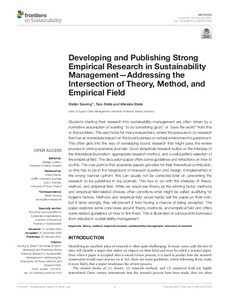| dc.date.accessioned | 2021-03-05T13:13:11Z | |
| dc.date.available | 2021-03-05T13:13:11Z | |
| dc.date.issued | 2021-02-05 | |
| dc.identifier | doi:10.17170/kobra-202103053429 | |
| dc.identifier.uri | http://hdl.handle.net/123456789/12589 | |
| dc.description.sponsorship | Gefördert durch den Publikationsfonds der Universität Kassel | |
| dc.language.iso | eng | |
| dc.rights | Namensnennung 4.0 International | * |
| dc.rights.uri | http://creativecommons.org/licenses/by/4.0/ | * |
| dc.subject | theory | eng |
| dc.subject | method | eng |
| dc.subject | empirical research | eng |
| dc.subject | sustainability management | eng |
| dc.subject | relevance of research | eng |
| dc.subject.ddc | 330 | |
| dc.title | Developing and publishing strong empirical research in sustainability management - adressing the intersection of theory, method, and empirical field | eng |
| dc.type | Aufsatz | |
| dcterms.abstract | Students starting their research into sustainability management are often driven by a normative assumption of wanting “to do something good” or “save the world” from this or that problem. This also holds for many researchers, where the pressure to do research that has an immediate impact on the local business or natural environment is paramount. This often gets into the way of developing sound research that might pass the review process in strong academic journals. Good (empirical) research builds on the interplay of the theoretical foundation, appropriate research method, and a well-justified selection of the empirical field. The discussion paper offers some guidelines and reflections on how to do this. The core point is that academic papers get cited for their theoretical contribution, so this has to be in the foreground of research question and design. If implemented in the wrong manner upfront, this can usually not be corrected later on, preventing the research to be published in top journals. This has to do with the interplay of theory, method, and empirical field. While we would see theory as the winning factor, methods
and empirical field-related choices often constitute what might be called qualifying for hygiene factors. Methods and empirical field would hardly sell the paper on their own, but if done wrongly, they will prevent it from having a chance of being accepted. The paper explores some core ideas around theory, methods, and empirical field and offers some related guidelines on how to link them. This is illustrated at some points borrowed
from debates in sustainability management. | eng |
| dcterms.accessRights | open access | |
| dcterms.creator | Seuring, Stefan | |
| dcterms.creator | Stella, Tara | |
| dcterms.creator | Stella, Mareike | |
| dcterms.extent | 9 Seiten | |
| dc.relation.doi | doi:10.3389/frsus.2020.617870 | |
| dc.subject.swd | Nachhaltigkeit | ger |
| dc.subject.swd | Management | ger |
| dc.subject.swd | Forschung | ger |
| dc.subject.swd | Methode | ger |
| dc.subject.swd | Empirische Forschung | ger |
| dc.type.version | publishedVersion | |
| dcterms.source.identifier | EISSN 2673-4524 | |
| dcterms.source.journal | Frontiers in sustainability | eng |
| dcterms.source.volume | Volume 1 | |
| kup.iskup | false | |
| dcterms.source.articlenumber | Article 617870 | |


